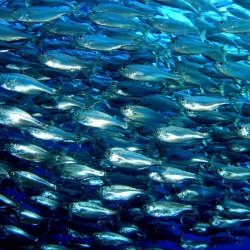
Pakistan, Thailand, the Philippines, Iran, and China are among the top 50 nations whose food security may be threatened by the effects that the rise of manmade carbon-dioxide (CO2) gas emissions are already starting to have on fish and shellfish, according to a new report by Oceana, an international ocean conservation organization.
While global warming is expected to affect the food supply of many nations by increasing drought, heat waves and torrential downpours, this report focuses on countries that depend heavily on the oceans for sustenance.
“Fish and seafood are an important source of protein for a billion of the poorest people on Earth,” said Matthew Huelsenbeck, a marine scientist with Oceana, “and about three billion people get 15 percent or more of their annual protein from the sea.”
In order to assess which countries are at greatest risk, Huelsenbeck and his colleagues looked at two entirely different effects of CO2 on the oceans: the warming caused when carbon dioxide traps extra heat from the Sun, and the rise in the acidity of seawater as it absorbs some human CO2 emissions to form carbonic acid.
Increased acidity makes it harder for shell-forming organisms, such as clams, oysters, and corals, to build their shells. That in turn affects people who depend on these sea creatures for food, or who eat the fish that depend on coral reefs for their habitat.
